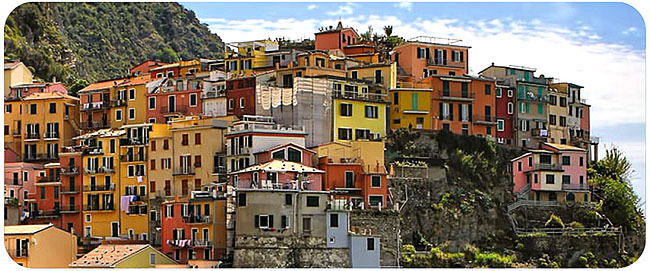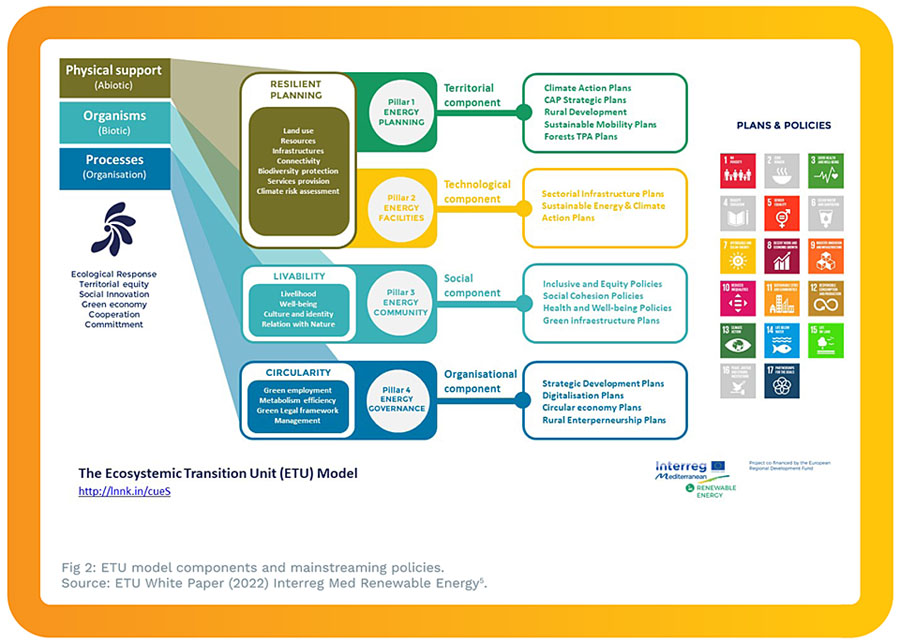Energy transition alredy mark the political agenda in the UE Members States, not only by the commitments achieved, but also by the urgency of Climate Change hazards.
The Mediterranean region is particularly vulnerable to climate change, being one of the world's most rapidly warming regions (rise of temperatures, sea level rise and scarcity of water and resources). Environmental degradation and overexploitation of natural resources poses additional challenges for the regional development. Energy supply is one of the priorities for Europe and Mediterranen regions , and most of the efforts should be oriented on renewables as the principal energy source option to support. The communities and institutions of the Mediterranean countries are now at a crossroad to turn this challenging situation into an opportunity. Despite the fact that urban areas are the most densely populated, rural areas represent more extension of European territory than urban areas. In the case of the MED area, this is not the exception, an important part of the territory of Portugal, Spain, France, Italy or Greece is considered as rural typology of regions (Eurostat 2021).
Rural regions are diverse and highly influenced by their specific natural endowments. Their development path is different from urban areas. Rural regions are often characterised by a lower population and development density, as well as a high proportion of natural assets and agricultural land1.

Rural areas face unique transition challenges, highlighting the importance of a just transition. Physical isolation, limited economic diversity, high rates of vulnerable populations due to lower incomes and higher poverty rates, combined with lower educational and employment opportunities and an aging population increase the vulnerability of rural communities. Declining public and private services in rural areas and remoteness and limited access also means higher car dependency. Consequently, some rural regions will likely experience employment losses and shifts, which need to be compensated. Ensuring an energy transition requires measures, tools to alleviate negative consequences and help firms, employees and regions to reorient.
The Interreg MED Renewable Energy project2 brings new ideas and initiatives for energy transition not only at scientific field but also for economy and social development. The aim of the project is to boost and mainstream the green energy transition in all rural and island municipalities across the region. In order to achieve this, the community is bringing together a group of like-minded municipalities and organisations committed to the Ecosystem Transition Unit (ETU)3 Initiative a goverance framework based on five main revitalisation principles: apply an ecological approach, ensure territorial equality, encourage social innovation, promote green economy, and based on cooperation and commitment.

The ETU Initiative4 is addressed to local authorities, entities and organisations that:
- Want to foster a local energy community;
- Are in the process of updating their Sustainable Energy Action Plan (SEAP) and developing their Sustainable Energy and Climate Action Plan (SECAP);
- Wish to promote a project or initiative linked to energy and ecological transition in their territory
The energy transition requires the active participation of society, local authorities and associations, businesses and innovative centres. The ETU aims to synthesise an integrated approach for the rural revitalisation process, taking energy transition as a starting point.
In the framework of the Interreg MED Renewable Energy project, the ETU Initiative launched a call in 2021 addressed to small municipalities, rural areas and islands6. The experience allowed to mainstreamed the ETU toolbox to 9 flagship cases across Spain, Italy, Croatia, and Greece by supporting their renewable energy plans, renewable energy communities, and strategic climate-neutral and circular economy projects. An overall impact on around 156,000 inhabitants distributed 21.3% in islands, 70.2% in small municipalities, and 8.5% in rural areas.
What we had learned is that rural areas despite of their low density, have a lot of potential when it comes to achieving energy transition objectives, also for the implementation of renewable energy communities. Nevertheless, rural areas and islands require tools and solutions to identify, coordinate and establish strategic alliances to accelerate the transition in an inclusive and green way.
The ETU Initiative continues encouraging other municipalities and local entities to join the movement by showcasing their energy transition actions based on an holistic governance approach (ecological, territorial, social and economic). Municipalities are invited to share their experiences and support the ETU principles through the Letter of Commitment7. All signatories will help to encourage the visibility of good practices based on fair and inclusive energy transition in rural areas.
We intive you to attend the official workshop as part of EU week of regions and cities:
Powering GREEN Energy Transition in rural communities through social and territorial innovation8 ONLINE - Tuesday, October 11, 2022 9:30 AM to 11:00 AM.
1. OECD (2020) »Managing Environmental and Energy Transitions for Regions and Cities« https://www.oecd-ilibrary.org.
2. https://renewable-energies.interreg-med.eu/
3. Cynthia Echave.; Danilo Ceh.; Alexia Boulanger.; Jennifer Shaw-Taberlet. (2019); An ecosystemic approach for the energy transition in the Mediterranean Region; SyNERGY MED 2019. shorturl.at/dnpS0
4. https://etuinitiative.eu
5. C. Echave et al. (2022) »ETU White Paper«. Interreg MED Renewable Energy. https://etuinitiative.eu/the-etu/#toolbox
6. ETU Flagship Cases Booklet.
7. https://etuinitiative.eu/etu-letter-of-commitment/
8. https://eu.app.swapcard.com/event/euregionsweek-2022/planning/UGxhbm5pbmdfOTYwNjMx